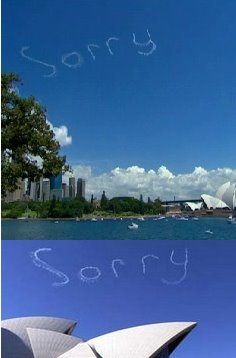So why don't I think an apology will open the floodgates?
I can think of four good reasons:
(1) The apology is about admitting moral, as distinct from legal, responsibility
In 1997, the High Court held that previous child removal laws in the Northern Territory were constitutional in Kruger v the Commonwealth. This means that the government had the legal power to pass those laws. In apologising, the government is simply saying it was morally wrong to exercise that legal power. There is no question, however, that it was not acting illegally in doing so.
The South Australian Supreme Court decision of Trevorrow suggests that stolen generation members would have to prove at least one of two things. They would have to show that their removal from their families or placement into State care was illegal, for example the government did not follow its own established laws or policies. Alternatively, they would have to prove that their removal or placement was negligent, such as where a child was placed into an abusive environment.
This means that anyone who wants to bring a court case seeking compensation for their wrongful removal as children must have existing legal rights. These rights are totally separate to any government apology. In this sense, a “stolen generations” claim would be no different to any other case that comes before the courts.
(2) The Commonwealth was never directly responsible for a centrally administered child-removal policy
The federal government never ran a national child removal policy. Instead, each of the States had their own laws and programs. The only exception was in the Northern Territory, where the federal government had responsibility for passing child removal laws due to constitutional reasons.
However, the federal government endorsed assimilation as the official national objective in Indigenous affairs at the Commonwealth/State Conferences on Native Welfare in 1937 and 1951. In this sense, it helped to set the policy environment in which child removals occurred, but it did not directly participate in the removal of Indigenous children in each of the States
This means that, in most cases, State governments or private care providers such as churches or religious orders would be the appropriate defendants, not the Commonwealth.
(3) An apology made in parliament is protected by parliamentary privilege
As the Senate Legal and Constitutional Affairs Committee observed in its "stolen generations" inquiry, Healing: a Legacy of Generations, all statements made within the parliament are protected by parlimentary privilege. Section 16(3) of the Parliamentary Privileges Act 1987 (Cth) explaims that:
In proceedings in any court or tribunal, it is not lawful for evidence to be tendered or received, questions asked or statements, submissions or comments made, concerning proceedings in Parliament, by way of, or for the purpose of:
questioning or relying on the truth, motive, intention or good faith of anything forming part of those proceedings in Parliament;
otherwise questioning or establishing the credibility, motive, intention or good faith of any person; or
drawing, or inviting the drawing of, inferences or conclusions wholly or partly from anything forming part of those proceedings in Parliament.
As the Federal Court has acknowledged in Hamsher and Ors v Minister for Immigration, Local Government and Ethnic Affairs, this provision is "expressed in terms of an absolute prohibition" which "cannot be waived in the absence of objection".
(4) The experience of the States and the Territories suggests otherwise
All of the State and Territory governments, along with other non-government organisations involved in the removal of children, have apologised. Interestingly, there has only been one successful court case since then, being the 2007 Trevorrow decision in the South Australian Supreme Court, in which the claimant was awarded $525K.
All of this tends to suggest that floodgates type arguments are based on a fear that is more hypothetical than real.


No comments:
Post a Comment